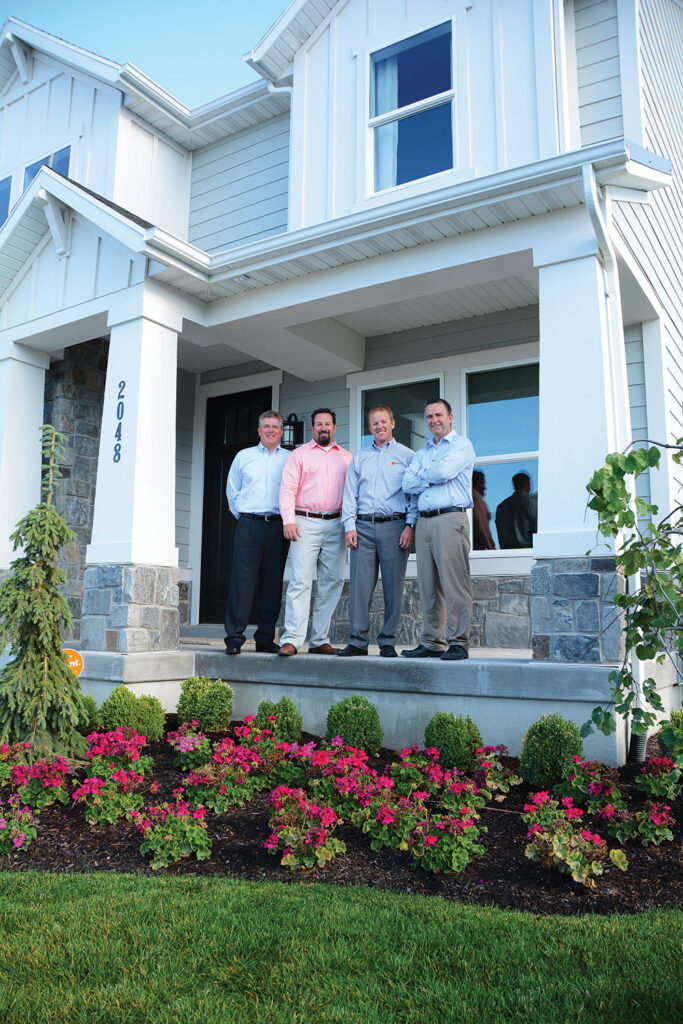Three-year growth 206%

Edge Homes is fast becoming a household name. With its beginnings in 2008 — yes, THAT 2008 — the residential construction company rose out of the doom and gloom to become a hometown hero. “At that time, you couldn’t give lots away,” says Joel Harris, co-founder of Edge Homes. “We dreamt of the day when someone would call and say, ‘Hey Joel and Gordy, will you build me a house?’” In fact, two people called Joel and Gordy (co-founder Gordon Jones) that year to build them houses. And the two business partners — who had started as a two-man framing operation 12 years prior — took that lead and built a $114-million company out of it. In 2014, Edge will sell nearly 600 homes. Because you know what they say … When one door closes, 600 open.
We don’t have to tell you what kind of year 2008 was in our industry. Everyone knows the turmoil and the distress. So many people left the industry, and it became this bleak, dark hole. It was so easy to get sucked into that despair.
We made a monumental decision to pull out of it — to gravitate toward optimism. We let all of the negativity go and focused on what we could control. We truly started functioning independent of the industry around us. We rolled up our sleeves and got to work.
Our community needed a good excuse to go out and build a home again — and we were prepared to give them that excuse. If we built a house on the right lot at the right price, people became interested. It was all about consumer confidence.
As bad as it was, it was the opportunity of a lifetime to start a new company. That energy and optimism propelled Edge in a way we couldn’t have hoped for or planned. People wanted to be part of something positive again. It helped shape who we are as a company. We couldn’t have done that in a status-quo market.
Even more importantly, it’s changed our focus looking forward. We don’t tolerate negative outlooks because no matter what’s in front of us, there is always an opportunity to grow and succeed. In 2008 our company was young, quick and nimble — we were able to adapt. And today? Our goal is to still be that nimble. Most mature companies are afraid of change — once they have a game plan that works, they lock themselves into it for fear of the unknown. We want our company to live in the now.
In order to do that, we are truly customer focused. It’s not so much about Edge, but about what the client needs and how we can meet those needs. Our vision for the company is based on innovative solutions — that’s our core value. Innovation for the sake of innovation is pointless. It has to have the customer in mind. What home do they need? What location do they need? What customization do they need? That’s what Edge is about.
Every time we close on a home, we issue a post-close survey. Our management team reads every single survey we send out. When we don’t meet or exceed expectations, that’s difficult for us. But at the same time, those surveys provide the greatest levels of satisfaction. Exceeding expectations and interacting with clients is infectious. We will never tire of it.
Our four managing partners all come to the table with large personalities. We enjoy a healthy debate, and we always arrive at a unified, cohesive decision — which is important. With that level of expertise and talent, we’d lose our momentum if the ships were steering in different directions.
Growing this fast is addictive. Every day there is a challenge and a new learning curve. But growing pains are fun when you’re armed with energy. All the problems we have are the right kind of problems — and they contribute to effective growth. Problems typically lead us to create a policy or system that prevents them from happening again. We don’t run from our problems. We embrace them — and then make them disappear.
We’re transparent at Edge. What you see is what you get. People feel our passion for the industry, for the customer and for the employee. Success is not about the bottom line — it’s about growing people. To us, money tends to be a by-product of success. It’s not indicative of success.
Our employees are our customers, too. We are obsessed with creating the right culture and opportunity for them. We want this environment to be so stable that when they go home to their family, they’re home. We work so hard to make sure there is a guarantee of tomorrow. It all comes down to balance. If work is good, they can focus on their family.
There have been a lot of milestones along the way, but success isn’t any one event. We haven’t arrived — and we don’t know that we ever will arrive. The joy is in the journey. We don’t know where we’ll be tomorrow, but we’re excited to see it.
We don’t run from our problems. We embrace them — and then make them disappear.